- The mission of Haywood Community College is to offer accessible educational, social, and cultural opportunities to residents of Haywood County and the surrounding area. Through its open-door policy, the College strives to meet the needs of students with varying backgrounds, resources, interests, abilities, and career goals. In recognition of this diversity, the College provides a variety of quality programs and services that are responsive to the needs of all individuals.
School Highlights
Haywood Community College serves 1,712 students (28% of students are full-time).
The college's student:teacher ratio of 7:1 is lower than the state community college average of 13:1.
Minority enrollment is 19% of the student body (majority Hispanic and Black), which is less than the state average of 48%.
Quick Stats (2025)
- Enrollment: 1,712 students
- In-state tuition: $2,580
- Out-state tuition: $8,724
- Student:teacher ratio: 7:1
- Minority enrollment: 19%
- Source: Verified school update
School Overview
The teacher population of 248 teachers has stayed relatively flat over five years.
Haywood Community College
(NC) Community College Avg.
Carnegie Classification
Associate's Colleges: Mixed Transfer/Career & Technical-Mixed Traditional/Nontraditional
Associate's Colleges: Mixed Transfer/Career & Technical-High Nontraditional
Institution Level
At least 2 but less than 4 years
At least 2 but less than 4 years
Institution Control
Public
Public
Total Faculty
248 staff
256 staff
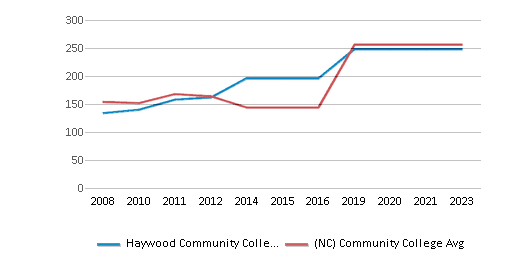
School Calendar
Student Body
The student population of Haywood Community College has stayed relatively flat over five years.
The student:teacher ratio of 7:1 has stayed the same over five years.
The Haywood Community College diversity score of 0.33 is less than the state average of 0.66. The school's diversity has grown by 8% over five years.
Total Enrollment
1,712 students
2,542 students
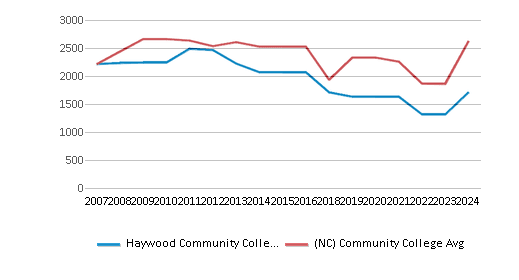
Student : Teacher Ratio
7:1
13:1
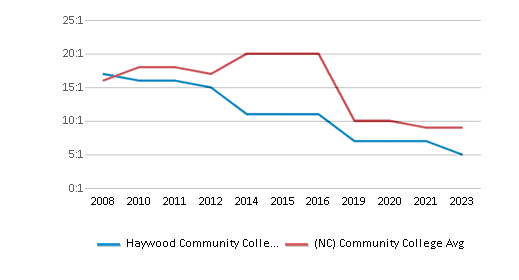
# Full-Time Students
471 students
766 students
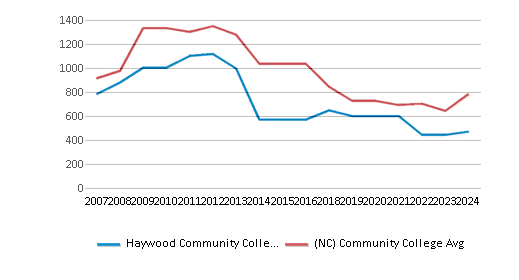
# Part-Time Students
1,241 students
1,813 students
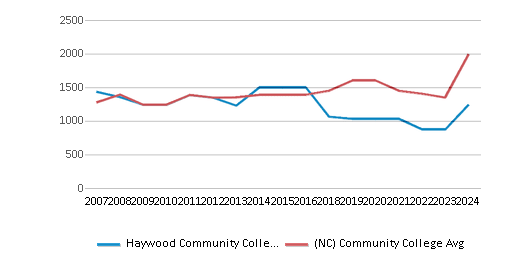
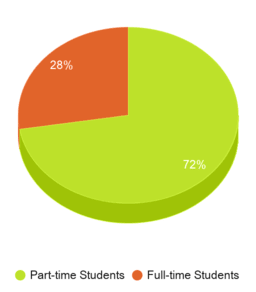
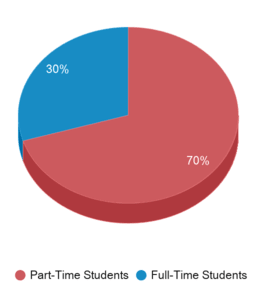
# Enrollment Undergraduate
171 students
316 students
# Full-Time Undergraduate Students
471 students
766 students
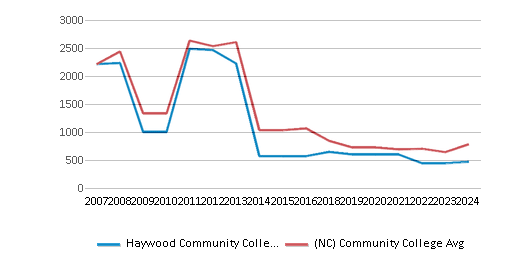
# Full-Time Graduate Students
n/a
22 students
# Part-Time Undergraduate Students
1,241 students
1,990 students
# Part-Time Graduate Students
n/a
3 students
Total Dormitory Capacity
n/a
717 students
% American Indian/Alaskan
2%
1%
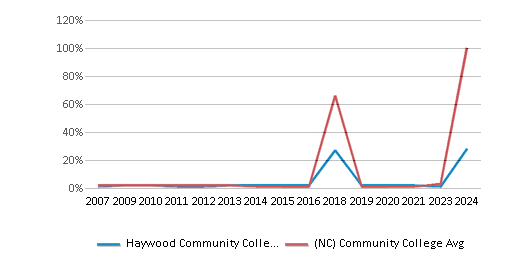
% Asian
1%
3%
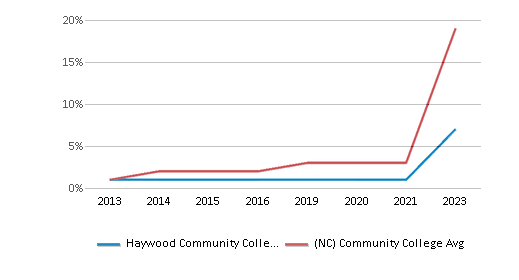
% Hispanic
7%
13%
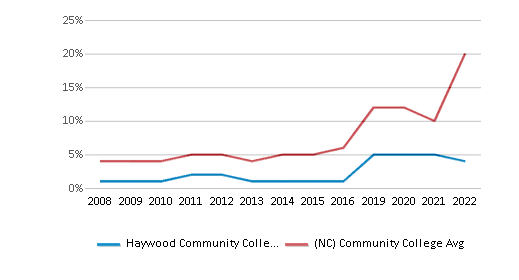
% Black
6%
21%
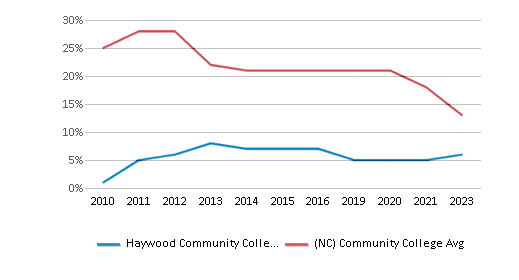
% White
81%
52%
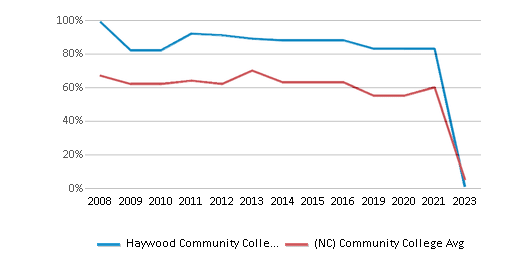
% Hawaiian
n/a
1%
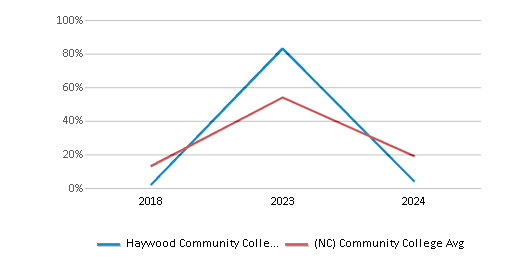
% Two or more races
1%
3%
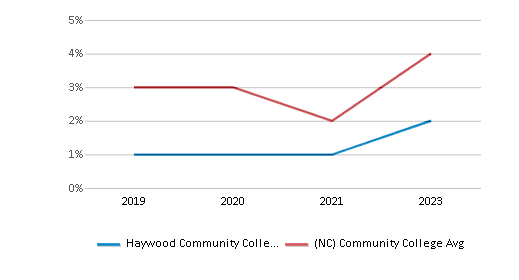
% Non Resident races
n/a
1%
% Unknown races
3%
5%
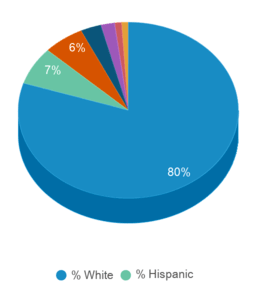
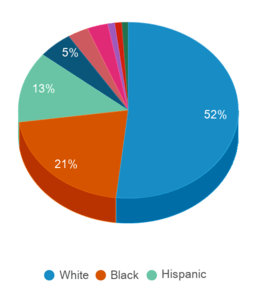
Diversity Score
0.33
0.66
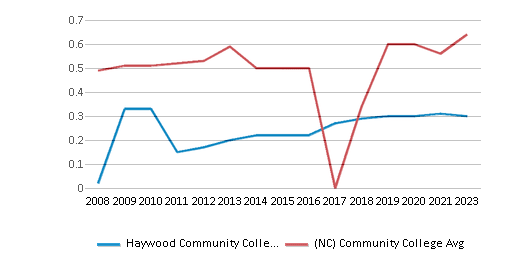
College Completion Rate (Students who graduate in less than 4 years)
0.2882%
0.3684%
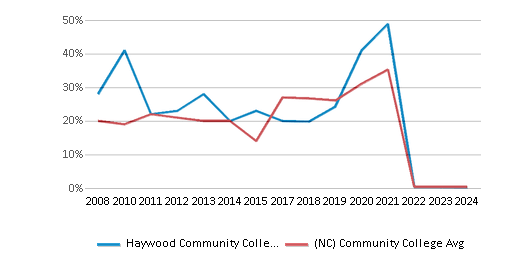
College Completion Rate (Students who graduate in 4 years or more than 4 years)
n/a
0.4286%
Average Graduate Earnings (10 Years)
$27,500
$27,500
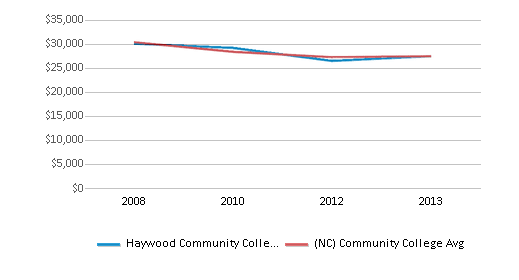
Tuition and Acceptance Rate
The public in-state tuition of $2,580 is less than the state average of $3,915. The in-state tuition has stayed relatively flat over four years.
The public out-state tuition of $8,724 is less than the state average of $9,508. The out-state tuition has stayed relatively flat over four years.
In-State Tuition Fees
$2,580
$3,915
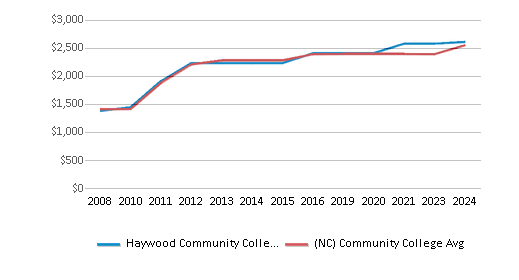
Out-State Tuition Fees
$8,724
$9,508
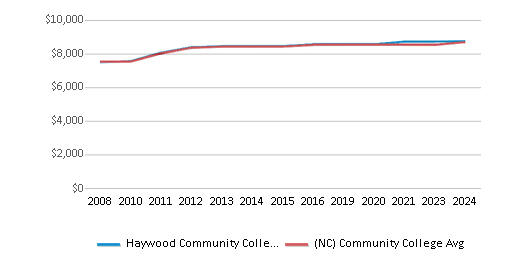
% Students Receiving Some Financial Aid
89%
82%
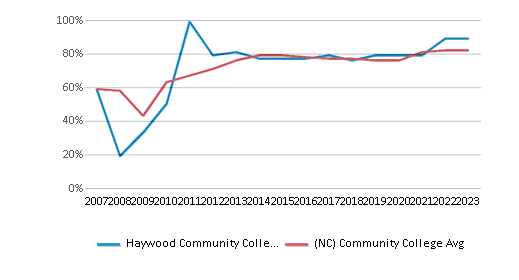
Median Debt for Graduates
$7,813
$10,500
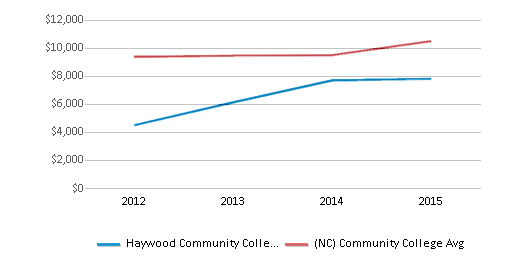
Median Debt for Dropouts
$4,517
$5,700
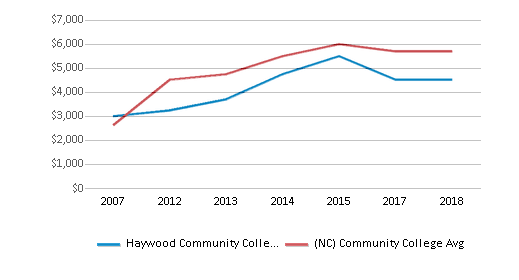
Acceptance Rate
n/a
82%
SAT Reading
n/a
488
SAT Math
n/a
498
ACT Composite
n/a
20
ACT English
n/a
13
ACT Math
n/a
16
Source: 2024 (or latest year available) Integrated Postsecondary Education Data System (IPEDS)
School Notes
- We are committed to providing comprehensive programs and services that are current, convenient, and affordable, and a supportive learning environment for you. In addition, Haywood Community College offers state-of-the-art instructional equipment, people who treat students as adults, and a campus acclaimed for its beauty. The design of associate degree programs, diploma programs and certificate programsprograms at Haywood Community College is to provide meaningful formal curricula meeting a wide variety of individual needs. To that end, the College offers the following degrees: Associate in Arts (AA), Associate in Applied Science (AAS), Associate in Science (AS), and Associate in General Education (AGE). The college also offers many diploma programs as well as certificate programs. Moreover, Haywood Community College makes available a wide range of course offerings in day, extended-day (evening), and distance learning formats. The College has courses and curricula designed for workforce development, college and university transfer, and for personal development and enrichment. Terminal curricula are those for individuals who plan to enter or remain in the workforce immediately upon concluding their program of studies at the College. Transfer curricula are for those planning to further their formal education through completion of a baccalaureate degree at a senior college or university. Transfer curricula normally consist of the first two years of a typical four-year baccalaureate degree. Students can also complete many courses on-line.
Frequently Asked Questions
How much does Haywood Community College cost?
Haywood Community College's tuition is approximately $2,580 for In-State students and $8,724 for Out-State students.
Recent Articles

Obtaining Your Bachelor's Degree at a Community College
Explore the evolving landscape of community colleges offering bachelor's degrees, addressing affordability, accessibility, and workforce needs.

A to Z of Community College Certificates and Courses
From business and healthcare to technology and skilled trades, the article showcases the breadth of options available to students seeking to enhance their knowledge, develop new skills, or pursue career advancement.

What is a Community College?
This comprehensive guide explains what a community college is, its history, and its role in higher education. It covers the types of programs offered, differences from four-year colleges, benefits of attending, and important considerations for prospective students, providing valuable insights for those exploring educational options.











